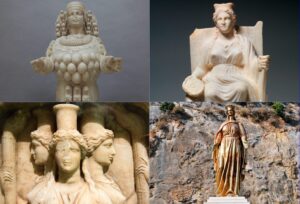 The plains and gentle mountains surrounding Ephesus and stretching across Anatolia are landscapes of profound fertility and beauty. These rich, abundant grounds not only nurtured the physical sustenance of early civilizations but also deeply influenced their spiritual and cultural lives. The fertile earth seemed to breathe life into the psyche of our ancestors, shaping their belief systems and daily practices. Early worship of Chthonic earth goddesses, embodying the raw, nurturing power of the land, reflected this deep connection. Over time, these ancient deities evolved, transforming into the more refined figures of Greco-Roman goddesses, yet always retaining the essence of their earthy origins, forever linking the land to the divine in the hearts and minds of those who dwelled there.
The plains and gentle mountains surrounding Ephesus and stretching across Anatolia are landscapes of profound fertility and beauty. These rich, abundant grounds not only nurtured the physical sustenance of early civilizations but also deeply influenced their spiritual and cultural lives. The fertile earth seemed to breathe life into the psyche of our ancestors, shaping their belief systems and daily practices. Early worship of Chthonic earth goddesses, embodying the raw, nurturing power of the land, reflected this deep connection. Over time, these ancient deities evolved, transforming into the more refined figures of Greco-Roman goddesses, yet always retaining the essence of their earthy origins, forever linking the land to the divine in the hearts and minds of those who dwelled there.
The ancient city of Ephesus, nestled in the fertile plains of Anatolia, became a crucible for the celebration of a diverse panoply of goddesses throughout the millennia. This sacred region bore witness to the veneration of powerful feminine deities, each embodying different aspects of life, nature, and the divine.
It began with the worship of Magna Mater, the Great Mother, whose nurturing presence symbolized the fertile earth itself. Her image, often depicted as a robust and life-giving force, laid the spiritual foundation for the region. Over time, this devotion evolved into the deep and lasting worship of Sibylla, a mother goddess whose mysteries and oracles captivated the ancients.
The plains around Ephesus became a sanctuary of the worship or Cybele, who enriched both our soils and souls. As Greek influence grew, Ephesus became a major center for the worship of Artemis, the virgin huntress and goddess of the wilderness. The grand Temple of Artemis, one of the Seven Wonders of the Ancient World, stood as a testament to her enduring significance. Alongside her, the dark and mystical Hecate was revered, embodying the crossroads of life and death, and the hidden realms of the underworld.
Demeter, goddess of the harvest, and Athena, the embodiment of wisdom and war, further enriched this tapestry of divine feminine power, each influencing the beliefs and practices of the Ephesian people. The seamless blending of these deities reflected the region’s dynamic cultural and spiritual evolution.
In later centuries, as Christianity spread, the worship of these ancient goddesses transitioned into the veneration of Mother Mary. Ephesus became a pilgrimage site, believed to be the final home of the Virgin Mary, symbolizing the continuation of the sacred feminine in a new religious context.
This rich and diverse worship of goddesses in and around Ephesus illustrates a profound spiritual continuity, where each deity, from Magna Mater to Mother Mary, played a vital role in shaping the beliefs, rituals, and lives of the people throughout the ages
 Paul, a close student of the healer and mystic Daskalos, has spent the last ten years exploring the roots of Christianity, with a focus the divine feminine. He has been to Ephesus more than 20 times and knows the area like the back of his hand. It is his pleasure to guide you through this culturally and spiritually rich landscape. He has developed an extensive website dedicated to the Goddess Artemis.
Paul, a close student of the healer and mystic Daskalos, has spent the last ten years exploring the roots of Christianity, with a focus the divine feminine. He has been to Ephesus more than 20 times and knows the area like the back of his hand. It is his pleasure to guide you through this culturally and spiritually rich landscape. He has developed an extensive website dedicated to the Goddess Artemis.
Cost: 2850,00, Single room surcharge: 300,00
Included:
Extra: